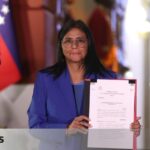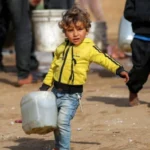
Chile is holding the first round of the presidential election this Sunday (16), in an environment marked by growing concern about public security. The increase in crime — today the main concern of voters, surpassing issues such as economy, health and education — has redefined the political debate in the country. Although the left leads the polls in this initial stage, surveys indicate that the right has a better chance of winning the second round, scheduled for December 14th.
President Gabriel Boric, on the left, supports the candidacy of Jeannette Jara, a former minister in his government and member of the Communist Party. She appears at the forefront of the polls, with around 30% of voting intentions. Next comes José Antonio Kast, representative of the far right for the Republican Party, with just over 20%. The dispute for third place is fierce between three names from the conservative camp: Johannes Kaiser, Evelyn Matthei and Franco Parisi. Despite Jara’s initial lead, polls indicate that she would be surpassed in a possible second round.
The change in the political climate contrasts with the 2021 election, when Boric won driven by mobilizations against inequality and the expectation of a new Constitution — a process that ended up not moving forward. Four years later, the population’s focus is different: crime has skyrocketed and has become the dominant issue. The homicide rate, for example, went from 2.3 per 100,000 inhabitants in 2015 to 6.0 in 2024. Kidnapping cases also broke a record last year, exceeding 860 records.
One of the factors fueling the debate is the strong wave of migration. Almost 700,000 Venezuelans now live in Chile, after leaving their country amid the crisis under the government of Nicolás Maduro. Some Chileans associate this increase in immigration with the increase in violence. According to sociologist Lucia Dammert, from the University of Santiago, the combination of higher crime and migratory flow created a “double shock” for the country: “We have not yet recovered from these shocks”, she stated. “And this is strongly reflected in the political debate, which was unable to overcome them and ended up feeding on these problems.”
The candidates’ proposals reflect this pressure. Kast advocates the expulsion of all undocumented immigrants and wants to implement the so-called “Border Shield”, which includes a 5-meter wall, 3-meter trenches and electric fences on the northern border. Jara, in turn, proposes revoking the banking secrecy of suspects to track illicit resources and reach the financial bases of criminal organizations.
In addition to the security agenda, Jara also defends policies such as the creation of a minimum wage, the setting of maximum prices for medicines and the establishment of the National Lithium Company. Kast is betting on limiting immigration, reducing public spending and expanding partnerships with the private sector in areas such as health and education.
The organized crime crisis is especially visible in the north of the country, which borders Peru and Bolivia — both major drug producers. The region only began to attract international criminal organizations after the migration flow increased. The former chief prosecutor of Tarapacá, Raul Arancibia, reports that he first heard about the Venezuelan group “Tren de Aragua” in 2021, when two women were detained when trying to enter Chile with drugs. Classified as a terrorist organization by the United States, the gang expanded and led to the spread of practices such as extortion and contracted murders. “Not even Chilean criminals were used to this type of violence, so they had to adapt,” said Arancibia.
Arancibia says he alerted authorities about the situation in 2021, but claims that his warnings were not heeded. When Boric took over the following year, homicides reached their highest level in years. In response, the government increased the police budget, approved new legislation, formed groups to combat organized crime and strengthened border control with support from the Armed Forces. The government says it has detained hundreds of Tren de Aragua members, keeping the group under pressure. For Dammert, however, focusing only on the border and international crime can divert attention from the internal roots of the problem.
Thus, this Sunday’s first round takes place in the midst of a restless society, divided between different views on how to face a crisis that has transformed the Chilean political scenario and that promises to be decisive in the choice of the next president.
Source: https://www.ocafezinho.com/2025/11/16/virada-politica-no-chile-criminalidade-impulsiona-avanco-da-direita-no-segundo-turno/


